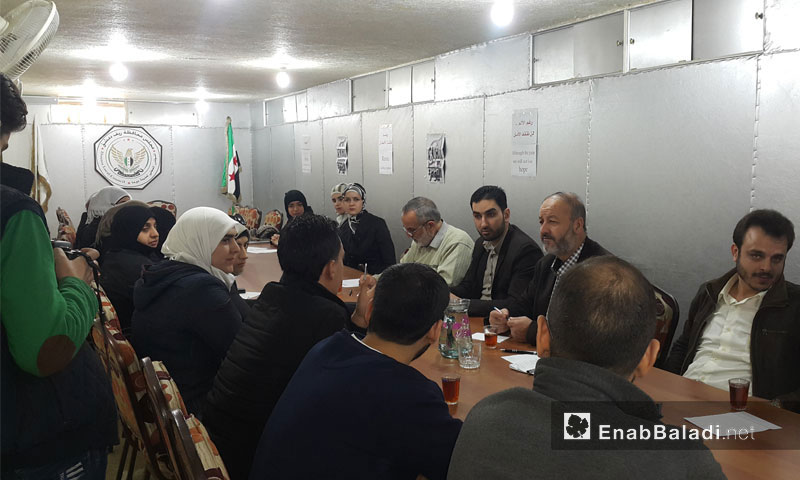Women’s organizations in Eastern al-Ghouta are still striving to increase their representation on the city council in a conservative society that opposes women working and getting involved in the struggle of working life.
The Women’s Bureau of the local city council of Douma has proposed increasing female representation on the council in a discussion that started in mid-November and will continue in the coming days.
The discussion took place in the local council headquarters in Douma city in the presence of women from civil society, members of the local council and the Deputy President of the Interim Government, Mr. Akram Tohme. The aim of the meeting was “to strengthen women’s role on the local council and discuss the need for women’s presence in different sectors of the labor market in al-Ghouta.”
According to Bayan Rihan, the manager of the council’s Women’s Bureau, the 25 women who participated in the discussion raised several points including modifying the local council’s internal regulations, reserving seats for women within the council, the need for women to move from executive to decision-making roles and the obstacles women face.
The staff in the Women’s Bureau in Douma began their work in the beginning of 2015, starting with a conference that brought together all the organizations managed by women or in which women work, in coordination with the Sham Center for Human Rights. The aim was to strengthen women’s roles in institutional work within local councils, according to the Bureau staff.
Some of the women working in the Education Directorate and in various organizations spoke about their personal experiences at work as an example of women’s success in various domains. Tohme welcomed the proposal and reiterated his support and readiness to cooperate to make sure that representation on the local council would no longer be restricted to men.
Huda Khayti, manager of the Women of al-Ghouta Center, described the discussion as “effective” and an opportunity to address a vital issue and support women’s role in the coming years. She told Enab Baladi, “We were promised positive things and we will wait to see what will come out of it.”
Rihan explained the proposal to increase women’s representation on the council, indicating that women candidates must fulfill certain criteria “such as having a university degree, being within a certain age group or possessing specialized skills.” She reasserted, “This is the case now among the female electorate, so engineers will nominate more than one person and will choose a candidate among themselves, and the same for doctors and teachers.”
Enab Baladi spoke to Khalil Aybour, an engineer and the President of the local council of Douma city. He said that a decision has yet to be taken, “We promised the women’s groups that the idea will be included in the priorities proposed by the council to be discussed during the process of modifying the internal regulations, which will be carried out by a committee recently formed for this purpose.”
The Douma city council includes 25 members, all male, composed of engineers, economists and agricultural, educational and health experts in addition to representatives of the neighborhood and trustees councils.
Aybour described the discussion as “constructive”. Regarding women candidates, he confirmed, “Women have never been barred from standing to become a member of the council.” He explained that in the last election two women were nominated from the education sector “but they did not win enough votes to become council members.”
According to Aybour, nominating women candidates is not limited to a specific category, “The seats are not monopolized by men, women can nominate themselves.” He called on women to “organize activities and events to promote themselves as the male candidates do.”
Despite their small numbers, working women in al-Ghouta see that the door is open for them to increase their presence. Others see that the role of women has evolved and that today women speak out, demand their rights, present their problems to experts and try to get involved in local management.











